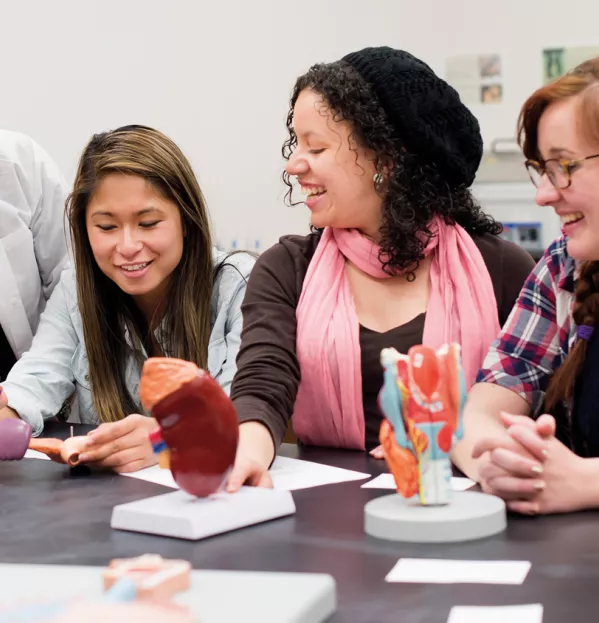Women working in Stem can reassure the next gen

Growing the number of girls interested in science, technology, engineering and maths (Stem) subjects and driving upwards the number of women in Stem jobs has been a political, social and economic priority for a number of years - from primary schools through to multinational corporations. And quite rightly, too, for a range of reasons.
To remain globally competitive, Scotland needs to drastically increase the number of workers with skills in engineering and digital technology; without women, we cannot be a global leader. Right now, only 9 per cent of engineers, just 18 per cent of digital technology employees and a tiny 1 per cent of construction workers are women.
Equate Scotland has been working on this issue for 10 years and we have seen improvements. For example, a decrease in the gendered nature of advertising in engineering has led to increases in women studying civil engineering. Progress certainly needs to speed up, but we are moving in the right direction. With so many organisations taking on gender-equality initiatives, it can be difficult to work out where we’ll have most success.
There is one space where we have the potential to work with schools, training providers, colleges and young women all at the same time and potentially make the biggest gains: modern apprenticeships. According to the most recent data this summer, 2 per cent of modern apprentices in automotive and construction, and 5 per cent in engineering and energy-related modern apprenticeships, are women.
Retaining talent
It’s not just about increasing women’s interest in these roles, but going a step further: retaining the talent we have and transforming these industries into places women want to be. Without that, we can pursue all the recruitment efforts we like, but we will not see the drastic change we need. This is why Equate Scotland is pleased to see the efforts on gender pursued by Skills Development Scotland (SDS), as well as our inclusion in its latest equalities action plan for modern apprenticeships.
For the past year or so, Equate Scotland has been working with SDS to test several initiatives to do with female modern apprentices in Stem. If there’s one thing we can be sure of, it is this: there is no limit to the enthusiasm and ambition that young women have for Stem.
Group mentoring has been a big part of tapping into that. As one participant put it: “[I liked] learning from a previous modern apprentice about her career path and meeting other women doing similar to me, as my course is all boys. It’s all women [here] so it feels safe.”
The young women we have been working with tell us that they feel enthusiastic about their modern apprenticeship but, equally, are still unsure of what a Stem career would look like. We have received the most positive feedback when female modern apprentices have had an opportunity to hear from and interact with a fellow female role model in their industry - someone who has made it beyond a modern apprenticeship and is pursuing a long-term career. They want reassurance that they won’t always be the only woman on the shop floor. A single intervention with a female role model has led to powerful, positive feedback, so imagine the impact of a sustained mentoring relationship.
Changing perceptions
One-off, ad-hoc interventions - while providing immediate inspiration - do not have a long-term, positive impact on subject choices at school or retention in the sector. Instead, programmes of events that build on one another through the school or college year, or a sustained relationship with a mentor, role model or industry partner, go a considerable way to changing perceptions, and empowering girls and women to pursue a Stem career.
So it’s unsurprising that our recent report, Rising to the Challenge, found that, when asked what in school would encourage girls to choose Stem, the highest-rated answers were regular talks from Stem industry representatives and the allocation of “science ambassadors” to every school - in other words, a consistency of message and the building up of a relationship with a role model.
Recently, SDS published an article on the importance of role models in tackling gender inequality. We would go one step further: a role model is fine in itself, but that person brings true value if trained on gender equality. If they have skills in mentoring and can build a longer-lasting partnership with the people they are forging relationships with, then their influence will grow and grow.
Initial feedback to the idea of role models for modern apprentices has been positive, and the potential benefits are twofold: female apprentices improve their own skills and confidence, while employers and training providers become knowledgeable and empathetic about gender inequality. A longer-term approach like this could change the entire culture around gender in Stem.
Of course, no single intervention will be the silver bullet. The issue of gender equality in Stem is complex and multilayered, starting from gender stereotypes at birth. But where we see potential for change, we must pursue it - we owe it to girls, women, our education system and our economy.
Talat Yaqoob is director of Equate Scotland
You need a Tes subscription to read this article
Subscribe now to read this article and get other subscriber-only content:
- Unlimited access to all Tes magazine content
- Exclusive subscriber-only stories
- Award-winning email newsletters
Already a subscriber? Log in
You need a subscription to read this article
Subscribe now to read this article and get other subscriber-only content, including:
- Unlimited access to all Tes magazine content
- Exclusive subscriber-only stories
- Award-winning email newsletters